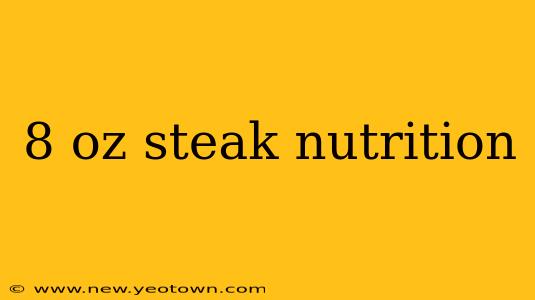The Nutritional Powerhouse: Unpacking the 8 oz Steak
Let's be honest, the aroma of a perfectly seared steak is enough to make anyone's mouth water. But beyond the deliciousness, what exactly are we consuming when we indulge in an 8-ounce serving of this culinary classic? This isn't just about calories; it's about understanding the nutritional profile of a food that's been a staple in diets worldwide for centuries.
This deep dive into the nutritional information of an 8-ounce steak will explore its various aspects, from protein content and fat distribution to vital micronutrients and potential health implications. We’ll also address some frequently asked questions surrounding steak consumption.
How many calories are in an 8-oz steak?
The calorie count of an 8-ounce steak is highly variable, depending on the cut of beef, the level of fat marbling, and the cooking method. A leaner cut like sirloin will have significantly fewer calories than a richer cut like a ribeye. Generally, an 8-ounce sirloin steak can range from 250 to 350 calories, whereas a ribeye of the same size might contain anywhere from 400 to 550 calories. Cooking methods also play a role; grilling will generally result in slightly fewer calories than pan-frying or deep-frying due to fat rendering.
What are the macronutrients in an 8-oz steak?
An 8-ounce steak is primarily a source of protein and fat, with minimal carbohydrates. The specific macronutrient breakdown will vary depending on the cut, but a general estimate for a leaner cut might look like this:
- Protein: Around 40-60 grams. Steak is an excellent source of high-quality protein, essential for building and repairing tissues, supporting immune function, and maintaining overall health.
- Fat: 10-30 grams. The fat content significantly influences the calorie count. While some fats are detrimental to health, steak also contains beneficial fats like conjugated linoleic acid (CLA), which has been linked to various health benefits.
- Carbohydrates: Negligible.
What vitamins and minerals are in an 8-oz steak?
Beyond the macronutrients, an 8-ounce steak offers a range of essential vitamins and minerals:
- Iron: Steak is an excellent source of heme iron, a form readily absorbed by the body. This is particularly important for red blood cell production and oxygen transport.
- Zinc: Important for immune function, wound healing, and cell growth.
- Vitamin B12: Crucial for nerve function, red blood cell formation, and DNA synthesis. Steak is a rich source of this vitamin, often lacking in vegetarian diets.
- Niacin (B3): Contributes to energy metabolism and DNA repair.
- Selenium: An antioxidant that protects cells from damage.
Is an 8-oz steak healthy?
The health implications of consuming an 8-ounce steak depend on several factors, primarily the cut and frequency of consumption. Leaner cuts, prepared with minimal added fat, can be part of a balanced diet. However, regularly consuming high-fat cuts and oversized portions can contribute to weight gain, high cholesterol, and other health issues. Moderation is key.
How much steak should I eat per week?
There’s no single answer to this question, as individual dietary needs and health conditions vary. Dietary guidelines often suggest limiting red meat consumption to a few servings per week. Consider incorporating leaner cuts and balancing your intake with plenty of fruits, vegetables, and whole grains.
What are the best cuts of steak for health-conscious individuals?
For health-conscious eaters, leaner cuts like sirloin, tenderloin, and top round are preferable to richer cuts like ribeye or prime rib, which are significantly higher in saturated fat.
The 8-ounce steak, when consumed mindfully, can be a nutritious and satisfying part of a well-rounded diet. However, understanding the nutritional content and choosing leaner cuts is crucial for reaping the benefits without compromising your health. Remember to always consult a healthcare professional or registered dietitian for personalized dietary advice.

